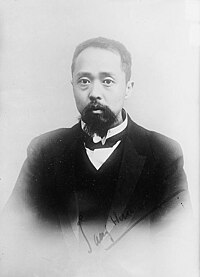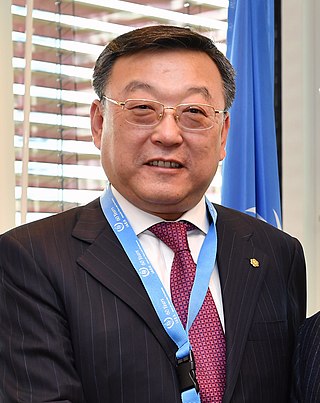
Tang Hualong (1874 – September 1, 1918) was the education minister from 1914 to 1915 and the interior minister in 1917 in the Republic of China. [1]

Tang Hualong (1874 – September 1, 1918) was the education minister from 1914 to 1915 and the interior minister in 1917 in the Republic of China. [1]
Tang Hualong was born in 1874, and was the older brother of naval officer Tang Xiangming. A prominent member of the Progressive Party of China, Tang served in the governments of Xu Shichang and Duan Qirui. He was assassinated on September 1, 1918 in Victoria, British Columbia, Canada by a local Chinese barber and Kuomintang member named Wong Chun (1886–1918), who later killed himself. [1] [2]

Overseas Chinese people are Chinese people who reside outside Greater China. As of 2011, there were over 40.3 million overseas Chinese. Overall, China has a low percent of population living overseas.

Luoyang is a city located in the confluence area of the Luo River and the Yellow River in the west of Henan province, China. Governed as a prefecture-level city, it borders the provincial capital of Zhengzhou to the east, Pingdingshan to the southeast, Nanyang to the south, Sanmenxia to the west, Jiyuan to the north, and Jiaozuo to the northeast. As of December 31, 2018, Luoyang had a population of 6,888,500 inhabitants with 2,751,400 people living in the built-up area made of the city's five out of six urban districts and Yanshi District, now being conurbated. By the end of 2022, Luoyang Municipality had jurisdiction over 7 municipal districts, 7 counties and 1 development zone. The permanent population is 7.079 million.

Audrey Tang is a Taiwanese politician and free software programmer who served as the first Minister of Digital Affairs of Taiwan from August 2022 to May 2024. She has been described as one of the "ten greatest Taiwanese computing personalities". In August 2016, Tang was invited to join Taiwan's Executive Yuan as a minister without portfolio, making her the first transgender person and the first non-binary gender official in the top executive cabinet. Tang has identified as "post-gender" and accepts "whatever pronoun people want to describe me with online." Tang is a leader of the Haskell and Perl programming language communities, and is the core member of g0v.

Ma Hualong, was the fifth leader of the Jahriyya, a Sufi order (menhuan) in northwestern China. From the beginning of the anti-Qing Muslim Rebellion in 1862, and until his surrender and death in 1871, he was one of the main leaders of the rebellion.

The China National Nuclear Corporation is a state-owned enterprise founded in 1955 in Beijing. CNNC's president and vice-president are appointed by the Premier of the People's Republic of China. CNNC oversees all aspects of China's civilian and military nuclear programs. According to its own mission statement, it "is a main part of the national nuclear technology industry and a leading element of national strategic nuclear forces and nuclear energy development."
The Constitutional Protection Movement was a series of movements led by Sun Yat-sen to resist the Beiyang government between 1917 and 1922, in which Sun established another government in Guangzhou as a result. It was known as the Third Revolution by the Kuomintang. The constitution that it intended to protect was the Provisional Constitution of the Republic of China. The first movement lasted from 1917 to 1920; the second from 1921 to 1922. An attempted third movement, begun in 1923, ultimately became the genesis for the Northern Expedition in 1926.

Ma is a Chinese family name. The surname literally means "horse". As of 2006, it ranks as the 14th most common Chinese surname in mainland China. In 2019 it was the 13th most common surname in mainland China. A 2013 study found it to be the 13th most common, shared by 17,200,000 people or 1.290% of the population, with the province with the most being Henan. It is the 52nd name on the Hundred Family Surnames poem.
The Teochew people or Chaoshanese, Teo-Swa people or Chaoshan people is an ethnic group native to the historical Chaoshan region in south China who speak the Teochew language. Today, most ethnic Teochew people live throughout Chaoshan and Hong Kong, and also outside China in Southeast Asia, including in Singapore, Malaysia, Thailand, Indonesia, Cambodia, Vietnam, and the Philippines. The community can also be found in diasporas around the world, including the United States, Canada, Australia, New Zealand, and France.

China is one of the world's largest producers of nuclear power. The country ranks third in the world both in total nuclear power capacity installed and electricity generated, accounting for around one tenth of global nuclear power generated. As of February 2023, China has 55 plants with 57GW in operation, 22 under construction with 24 GW and more than 70 planned with 88GW. About 5% of electricity in the country is due to nuclear energy. These plants generated 417 TWh of electricity in 2022 This is versus the September 2022 numbers of 53 nuclear reactors, with a total capacity of 55.6 gigawatt (GW). In 2019, nuclear power had contributed 4.9% of the total Chinese electricity production, with 348.1 TWh.
The Progressive Party was a political party in the Republic of China from 1913 to 1916.
Hualong Hui Autonomous County is a county in the east of Qinghai Province, China. It is under the administration of Haidong City. Its area is 2,790 square kilometers and has a population of 203,317 in 2010.
China General Nuclear Power Group (CGN), formerly China Guangdong Nuclear Power Group (中国广东核电集团), is a Chinese state-owned energy corporation under the SASAC of the State Council.
The Fuqing Nuclear Power Plant is a nuclear power plant in Fuqing, Fujian Province, China. The plant is located on the coast of Xinghua Bay, near Qianxue Village, Sanshan Town. The station has four 1,089 megawatt (MW) CPR-1000 pressurized water reactors (PWRs). The CPR-1000 is an advanced PWR design developed by China from the Areva-designed PWRs at the Daya Bay Nuclear Power Plant. The plant was jointly constructed and is operated by China National Nuclear Corporation (51%), China Huadian Corp. (39%) and the Fujian Investment & Development Co Ltd. (10%).
Fangchenggang Nuclear Power Plant, also known as Fangchenggang Hongsha Nuclear Power Plant, is a nuclear power plant in Fangchenggang, near Hongsha Village(simplified Chinese: 红沙村; traditional Chinese: 紅沙村), autonomous region of Guangxi in the People's Republic of China. A total of six reactors are planned to operate at the Fangchenggang site. Units 1 and 2 are both CPR-1000s, units 3–4 are Hualong Ones, units 5–6 are planned also to be Hualong One reactors. Fangchenggang 3 and 4 will be the reference plant for the proposed Bradwell B plant in the UK.

Li or Lee is a common Chinese surname, it is the 4th name listed in the famous Hundred Family Surnames. Li is one of the most common surnames in Asia, shared by 92.76 million people in China, and more than 100 million in Asia. It is the second-most common surname in China as of 2018, the second-most common surname in Hong Kong, the most common surname in Macau and the 5th most common surname in Taiwan, where it is usually romanized as "Lee". The surname is pronounced as in Cantonese, Lí (poj) in Taiwanese Hokkien, but is often spelled as "Lee" in Hong Kong, Macau, Taiwan, Thailand and many overseas Chinese communities. In Macau, it is also spelled as "Lei". In Indonesia it is commonly spelled as "Lie". The common Korean surname, "Lee", and the Vietnamese surname, "Lý", are both derived from Lee and written with the same Chinese character (李). The character also means "plum" or "plum tree".
The Unity Party was a short-lived political party in the early of the Republican period of China from 1912 to 1913.

The Hualong One is a Chinese Generation III pressurized water nuclear reactor jointly developed by the China General Nuclear Power Group (CGN) and the China National Nuclear Corporation (CNNC). The CGN version, and its derived export version, is called HPR1000. It is commonly mistakenly referred to in media as the "ACPR1000" and "ACP1000", which are in fact earlier reactors design programs by CGN and CNNC.

Tang Dengjie is a Chinese politician and business executive who is currently serving as the Communist Party secretary of Shanxi.
Events from the year 1874 in China.
The New Republic or New Republic Chinese Daily was a Chinese language newspaper published first in Victoria and then in Vancouver, Canada possibly from 1912 to 1984. Most early issues of the newspaper were lost or were sporadically preserved in BC Archives, Nanjing Library in China, and Library & Archives Canada (1957-1970).